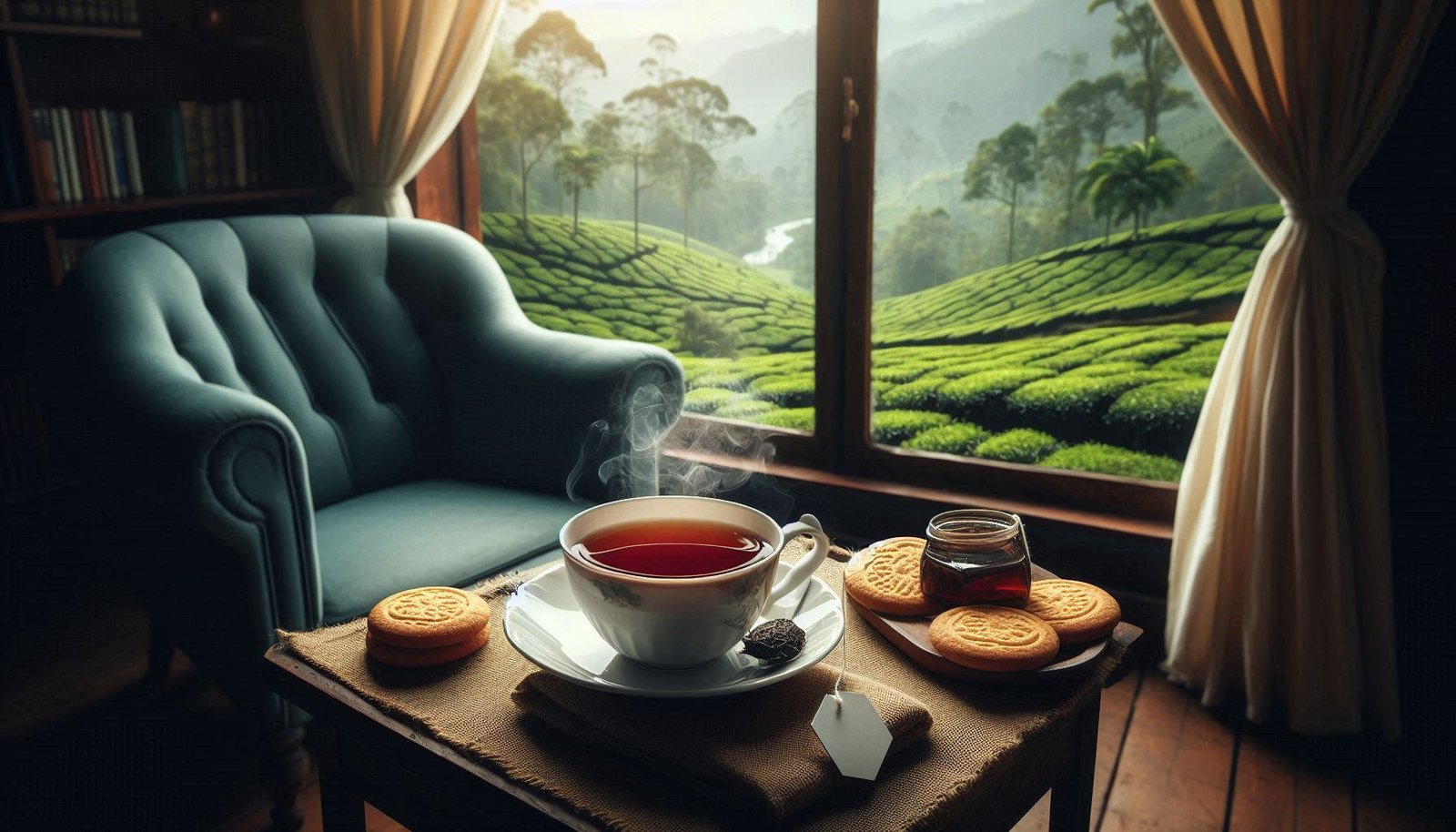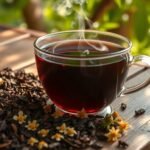Ceylon black tea, also known as Sri Lankan tea, is famous for its bold taste. Many wonder if it has caffeine. Yes, it does, with 50 to 90 milligrams per 8-ounce cup.
Sri Lanka, once called Ceylon, is where this tea comes from. People enjoy it hot, often with lemon, sugar, or milk. It’s made in different regions, based on how high it’s grown.

Key Takeaways
- Ceylon black tea contains 50-90 mg of caffeine per 8-ounce cup.
- Sri Lanka, formerly known as Ceylon, is the origin of Ceylon tea.
- Ceylon tea is consumed freshly brewed and hot, often with lemon, sweeteners, or milk.
- Ceylon teas are classified by altitude: high grown, medium grown, and low grown.
- Sri Lanka’s seven tea-growing regions produce Ceylon teas with unique flavor profiles.
Understanding Ceylon Black Tea Origins
The history of Ceylon tea production began in the 1860s. James Taylor planted the first tea in Kandy, Sri Lanka, then called Ceylon. Since then, Sri Lanka has become a top tea producer worldwide, known for its high-quality teas.
Tea Growing Regions in Sri Lanka
Sri Lanka has seven tea-growing regions, each with its own special traits. These regions are:
- Uda Watte
- Ran Watte
- Yata Watte
- Meda Watte
- Uva
- Dimbula
- Nuwara Eliya
Teas from each place taste different because of the area’s elevation, climate, and soil. This variety leads to many flavor profiles.
What Makes Ceylon Tea Special
Ceylon tea is known for its rich and varied flavors. This is thanks to Sri Lanka’s unique geography and climate. The tea is divided into three altitudes: high, medium, and low grown. Each altitude produces teas with unique characteristics.
This variety means Ceylon tea suits many tastes. You can find everything from bold and robust to delicate and fragrant teas.

“Ceylon tea is celebrated for its balanced caffeine levels, providing an uplifting yet gentle effect.”
Does Ceylon Black Tea Have Caffeine
Yes, Ceylon black tea does contain caffeine. A typical 8-ounce cup has 50 to 90 milligrams of caffeine. This is more than green or white tea from the same area.
The amount of caffeine in Ceylon black tea can change. This depends on the brewing time, water temperature, and tea leaf quality. Longer steeping and hotter water mean more caffeine in your tea.
Remember, Ceylon black tea has less caffeine than coffee. Coffee usually has 95-200 milligrams of caffeine. So, Ceylon black tea is a moderate source of caffeine. It’s great for a balanced energy boost without the jitters or crash.
“Ceylon black tea is known to have a unique and complex flavor profile that is often described as rich, full-bodied, and slightly sweet – a perfect complement to its moderate caffeine content.”
Looking for a morning pick-me-up or an afternoon tea break? Ceylon black tea is a enjoyable and health-conscious choice. It gives you caffeine’s benefits without the downsides of high-caffeine drinks.

Caffeine Content in Different Ceylon Tea Varieties
Several factors affect the caffeine in Ceylon tea. The type of tea leaf, the altitude it’s grown at, and how it’s processed all play a part. These elements determine the caffeine levels in different Ceylon teas.
Factors Affecting Caffeine Levels
Black Ceylon tea usually has more caffeine than green or white teas. This is because black tea is processed more oxidatively. Also, tea grown at higher elevations often has more caffeine than tea from lower altitudes.
Comparison with Other Tea Types
Ceylon black tea has a moderate to high caffeine level. It typically has 23 to 110 milligrams of caffeine per 8-ounce serving. This is less than coffee, which can have 95 to 200 milligrams per 8-ounce cup.
Brewing Time and Caffeine Release
The time you brew your Ceylon tea affects its caffeine content. Longer brewing times extract more caffeine from the leaves. This makes the tea more caffeinated.

“Consuming excessive caffeine can lead to negative effects such as insomnia, headaches, anxiety, increased heart rate, dehydration, and addiction.”
Some people may need to limit or avoid caffeine due to health reasons or personal choices. Enjoying ceylon tea caffeine levels in moderation is important.
The Unique Characteristics of Ceylon Black Tea
Ceylon black tea comes from Sri Lanka and is known for its amazing taste and smell. It has a strong, full flavor and medium to full tannins. You might taste citrus, chocolate, or spice in it. The leaves are long and thin, showing the tea makers’ skill.
This tea is special because it’s bright and brisk. It’s great for both hot and cold tea. The tea plants grow well in Sri Lanka’s climate and soil. The tea makers’ careful work adds to its ceylon tea flavor profile, ceylon tea aroma, and ceylon tea qualities.
| Characteristic | Description |
|---|---|
| Flavor Profile | Bold, full-bodied with medium to full tannins. Notes of citrus, chocolate, or spice. |
| Appearance | Long, thin, and wiry tea leaves. |
| Brewing | Brisk and bright, suitable for both hot and iced tea preparations. |
| Origin | Exclusively grown and produced in Sri Lanka (formerly Ceylon). |
Ceylon black tea is loved by many tea lovers around the world. It’s perfect for hot or cold tea. This tea gives a unique and enjoyable taste experience.

Health Benefits of Ceylon Black Tea
Ceylon black tea is known for its unique taste and quality. It’s grown in Sri Lanka’s beautiful hills. This tea is full of polyphenols, antioxidants, and other good stuff that can make you feel better.
Antioxidant Properties
Ceylon black tea is loaded with antioxidants like catechins, theaflavins, and thearubigins. These fight off free radicals. They can help prevent cell damage and lower the risk of cancer and other diseases.
Cardiovascular Benefits
Drinking Ceylon black tea regularly can be good for your heart. The antioxidants in it can lower bad LDL cholesterol. This can help prevent heart disease and improve heart health.
The theaflavins in Ceylon black tea also help control blood sugar levels. This is good for managing diabetes.
Mental Performance Enhancement
Ceylon black tea has caffeine and L-theanine. Together, they boost focus, concentration, and alertness. This mix can improve your brain function and help prevent age-related brain decline.

“Ceylon black tea is a true gift from nature, offering a delightful experience while also providing valuable health benefits that can positively impact our overall well-being.”
How to Properly Brew Ceylon Black Tea
Brewing the perfect cup of Ceylon black tea is an art. It brings out the full flavor and aroma of this renowned tea. Whether you’re new to tea or a seasoned lover, learning how to brew Ceylon tea is essential.
Start with fresh, quality Ceylon black tea leaves. The best water temperature is between 194-205°F (90-96°C). Use about 1 teaspoon of tea leaves for every 8 ounces of water. Let the tea steep for 3-5 minutes, depending on how strong you like it. Gently stir the tea leaves after they settle for the best flavor.
Steeping for longer makes the tea stronger and more caffeinated. But, don’t steep too long, or it will taste bitter. The goal is to find a balance between strong flavor and smooth taste.
| Brewing Parameter | Recommendation |
|---|---|
| Water Temperature | 194-205°F (90-96°C) |
| Tea Leaf Quantity | 1 teaspoon per 8 ounces of water |
| Steep Time | 3-5 minutes |
| Agitation | Gently after leaves have settled |
By following these tips, you’ll make the perfect cup of Ceylon black tea. Enjoy the rich flavor and aroma that makes Ceylon tea a favorite among tea lovers everywhere.
Ceylon Tea Grades and Quality Standards
Ceylon tea is known for its high quality. It’s graded based on leaf size and excellence. Grades like Orange Pekoe (OP), Broken Orange Pekoe (BOP), and Flowery Orange Pekoe (FOP) show the tea’s quality. OP has the biggest leaves, while BOP and FOP have smaller, broken ones.
Understanding Tea Leaf Grades
Ceylon Black Tea is made using the orthodox method. Most of the industry uses this method. A smaller part uses the CTC (Crush, Tear, Curl) method.
The orthodox method creates many grades. These range from whole leaves to broken ones. The CTC method makes broken leaves and dust grades.
The Lion Logo Certification
The Lion Logo is a sign of quality for Ceylon tea. It shows the tea meets high standards and comes from Sri Lanka. This logo is trusted by tea lovers worldwide.
Ceylon Black Tea comes in many flavors and formats. You can find Earl Grey, English Breakfast, and fruit-flavored teas. Its rich history and quality make it a favorite among tea lovers.
Different Growing Altitudes and Their Impact
Ceylon teas are known for their high quality. This quality comes from the different heights where they grow in Sri Lanka. There are three main types: high grown (above 4,000 feet), medium grown (2,000-4,000 feet), and low grown (sea level to 2,000 feet). Each height gives the tea its own special taste.
High-grown teas, like those from Nuwara Eliya, are famous for their light and floral flavors. The cool weather and high places are perfect for the tea plants. This makes a tea that’s light, refreshing, and a bit citrusy. The slow growth of these high grown ceylon tea leaves makes the tea sweeter and more complex.
On the other hand, low grown ceylon tea from places like Ruhuna is full-bodied. It tastes like honey, caramel, and has a strong feel. The warm weather of the lowlands makes these teas richer and more intense. They have a deep color and a smooth finish.
The ceylon tea altitudes in the middle, like Dimbulla and Uva, are a mix of the light and full-bodied teas. These teas have a mix of floral, fruity, and malty tastes. They are great for those who like a variety of flavors.
| Tea Altitude | Growing Region | Flavor Profile |
|---|---|---|
| High Grown | Nuwara Eliya | Delicate, floral, refreshing |
| Medium Grown | Dimbulla, Uva | Balanced, floral, fruity, malty |
| Low Grown | Ruhuna | Full-bodied, honey, caramel |
Knowing about the ceylon tea altitudes is important for tea lovers. It helps them understand the different tastes of Ceylon tea. This way, they can pick the perfect tea for themselves.
Flavor Profile and Tasting Notes
The diverse terroir of Sri Lanka leads to a wide range of ceylon tea flavor variations. From the light, floral notes of Nuwara Eliya to the sweet taste of Uva, each region offers a unique taste. Dimbula teas have a mellow character, making each Ceylon tea special.
The seasonal effects on flavor in Ceylon tea are fascinating. The best teas are made in specific months in each region. Changes in climate, rainfall, and sunlight greatly affect the tea leaves’ taste and smell.
- Nuwara Eliya teas are prized for their delicate, floral flavors with hints of citrus.
- Uva teas boast a sweet, almost honey-like taste, often with a subtle dryness on the palate.
- Dimbula teas are known for their mellow, balanced character, making them a versatile choice for tea drinkers.
Exploring the nuanced ceylon tea flavor variations across Sri Lanka’s tea-growing regions and seasons is a true sensory journey. It shows how terroir deeply affects this revered beverage.
“Each sip of Ceylon tea is a taste of the island’s rich tapestry, where climate, soil, and the skilled hands of tea masters converge to create a symphony of flavors.”
Best Times to Drink Ceylon Black Tea
Ceylon black tea is great any time of day. Its caffeine and strong flavor are perfect for a morning or afternoon boost. Many people like to drink it in the morning for a gentle energy lift and clear mind.
But, it’s best to avoid Ceylon black tea at night. The caffeine can mess with your sleep if you drink it too close to bedtime. If you’re sensitive to caffeine, drink it earlier in the day.
Ceylon black tea is also good hot or cold. It’s great for a cool afternoon or with a big meal. It offers a comforting and refreshing experience.
| Consumption Time | Benefits |
|---|---|
| Morning | Provides a gentle energy boost and mental clarity to start the day |
| Afternoon | Offers a rejuvenating pick-me-up during the workday |
| Evening | Avoid due to potential sleep disturbances from the caffeine content |
The best time to drink Ceylon black tea is when it feels right for you. Try different times to see what works best for your day and taste.
“Ceylon black tea is a versatile beverage that can be enjoyed throughout the day, providing a gentle energy boost and mental clarity when consumed in the morning or afternoon.”
Storage and Shelf Life Tips
Keeping your Ceylon black tea fresh is key for a great taste. Here are some easy tips to help you store and extend the life of your tea:
- Keep your Ceylon tea in a sealed container, away from light, heat, moisture, and strong smells. A cool, dry spot is perfect for storing ceylon tea.
- With proper storage, your Ceylon black tea can stay flavorful for up to 18 months. This gives you a longer ceylon tea shelf life.
- Loose-leaf Ceylon tea lasts longer than tea bags because it’s less exposed to air and other factors.
- Don’t store your Ceylon tea near spices or in the fridge. This can cause moisture and flavor loss, ruining the preserving tea quality.
By sticking to these tips, your Ceylon black tea will keep its bold, bright, and citrusy taste longer. This lets you enjoy its unique flavors fully.
“Proper storage is the key to preserving the delicate balance of flavors in Ceylon black tea. With the right techniques, you can enjoy the full spectrum of this tea’s taste for months to come.”
Choosing Quality Ceylon Black Tea
When you buy authentic Ceylon black tea, look for certain signs. The Lion Logo is a key indicator. It shows the tea comes from Sri Lanka.
For top quality, pick loose-leaf Ceylon black tea. It lets you enjoy the tea’s rich aroma and complex tastes. Also, check the packaging date and origin to make sure it’s fresh and real.
What to Look for When Buying
- Look for the Lion Logo to know it’s genuine Ceylon black tea.
- Choose loose-leaf tea for the best taste and quality.
- Check the packaging date and origin information for freshness and authenticity.
- True Ceylon black tea should smell fresh and look like its grade.
Authentic vs. Counterfeit Products
Watch out for unusually low prices. They might mean the tea is fake. Trustworthy tea sellers and specialty stores are your best bets for authentic Ceylon black tea. They know their suppliers well and can assure the tea’s quality and origin.
“Choosing high-quality Ceylon black tea is essential for experiencing the full depth of flavor and aroma that this renowned tea has to offer.”
Popular Ceylon Tea Brands and Products
Ceylon tea is loved by tea lovers everywhere for its top-notch quality and unique taste. Top ceylon tea brands like Dilmah, Basilur, and Mlesna offer a wide range of best ceylon teas. These teas come from different places and heights in Sri Lanka.
Dilmah, a family-run tea company, is known for its single-origin popular ceylon tea products. They highlight the special flavors of various tea estates. Their teas include black, green, and flavored varieties, showing the wide range of Ceylon tea.
- Dilmah’s Dimbula Black Tea is a hit with Ceylon tea fans for its strong, full flavor.
- Basilur, famous for its handmade teas, has a big selection of ceylon tea brands. They offer teas like the bold Basilur Masala Chai and the light Basilur White Tea.
- Mlesna, a leader in Ceylon tea, is known for its top-notch popular ceylon tea products. Their Mlesna Earl Grey tea is a favorite, mixing bergamot’s citrus with Ceylon black tea’s strength.
These ceylon tea brands bring the true taste of Ceylon to you. They also have creative flavored and blended teas for all tastes. Whether you want a classic Ceylon black tea or something more unique, these brands promise a great tea experience.
| Brand | Popular Ceylon Tea Products | Flavor Profile |
|---|---|---|
| Dilmah | Dimbula Black Tea, Earl Grey, Green Tea | Rich, full-bodied, aromatic, floral |
| Basilur | Masala Chai, White Tea, Lemon Tea | Spicy, delicate, citrusy |
| Mlesna | Earl Grey, Cinnamon Tea, Organic Black Tea | Bergamot, cinnamon, smooth |
These ceylon tea brands and their popular ceylon tea products let you explore the rich world of Ceylon tea. They meet the high standards of tea lovers everywhere.
Conclusion
Ceylon black tea is a versatile and flavorful drink with a rich history. It has ceylon black tea benefits like antioxidants and moderate caffeine. This makes it a favorite among tea lovers everywhere.
The different growing areas in Sri Lanka give teas with unique tastes. This shows the depth and complexity of this famous tea.
In this ceylon tea guide summary, we talked about how to brew and store Ceylon black tea right. This brings out all its flavors and benefits. Whether you like classic Ceylon tea or specialty blends, it always impresses tea fans around the world.
Ceylon black tea is loved for its history and health benefits. Knowing more about this tea helps tea enthusiasts enjoy its special qualities. It truly stands out in the tea world.
FAQ
Does Ceylon black tea contain caffeine?
Yes, Ceylon black tea does contain caffeine. The amount can vary based on leaf type and brewing method.
How much caffeine is typically found in Ceylon black tea?
Ceylon black tea usually has 50-90 mg of caffeine per 8-ounce cup. Brewing time, water temperature, and leaf grade can change this amount.
How does the caffeine in Ceylon black tea compare to other tea types?
Ceylon black tea has more caffeine than green or white teas from the same area. It has a moderate to high caffeine level, less than coffee.
What factors affect the caffeine content in Ceylon black tea?
Ceylon black tea’s caffeine can be affected by leaf type, altitude, and processing. Longer brewing times also increase caffeine.
What are the health benefits of Ceylon black tea?
Ceylon black tea has polyphenols like antioxidants. These may lower heart disease and cancer risks. It also boosts focus and mental alertness with caffeine and L-theanine.
How should Ceylon black tea be brewed for optimal flavor and caffeine extraction?
Use 194-205°F (90-96°C) water for brewing. Add 1 teaspoon of tea leaves per 8 ounces of water. Steep for 3-5 minutes. Agitate the leaves for better flavor.
How is Ceylon tea graded and what do the different grades mean?
Ceylon tea is graded by leaf size and quality. Grades include Orange Pekoe (OP), Broken Orange Pekoe (BOP), and Flowery Orange Pekoe (FOP). The Lion Logo shows quality standards set by the Sri Lankan Tea Board.
How do the different growing altitudes in Sri Lanka affect the flavor of Ceylon tea?
Altitude affects Ceylon tea flavor. High-grown teas are delicate and floral. Low-grown teas are fuller-bodied with honey and caramel notes.
How can I ensure I’m buying authentic Ceylon black tea?
Look for the Lion Logo for authenticity. Choose loose leaf tea for quality. Check packaging date and origin. Avoid low prices for genuine tea. Reputable vendors and shops sell genuine Ceylon tea.
Also Read:









